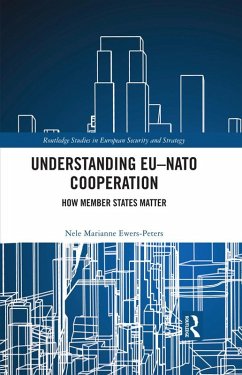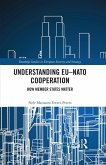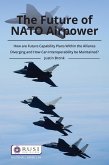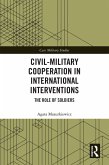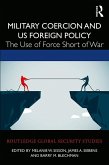Dieser Download kann aus rechtlichen Gründen nur mit Rechnungsadresse in A, B, BG, CY, CZ, D, DK, EW, E, FIN, F, GR, HR, H, IRL, I, LT, L, LR, M, NL, PL, P, R, S, SLO, SK ausgeliefert werden.
'Understanding EU-NATO Cooperation: How Member States Matter offers the reader a systemic account of how member states shape EU-NATO cooperation. It enriches the EU-NATO literature, and the interorganisational cooperation literature more broadly, through its detailed account of an understudied question, namely, the ways in which member states can circumvent legal and institutional barriers to shape EU-NATO cooperation. In showing how member states contribute to the dysfunctionality of EU-NATO relations, Ewers-Peters' book will be of considerable interest to scholars of European security.'-- Jocelyn Mawdsley, Newcastle University, UK
'NATO and the EU have many common members and share similar goals, yet they often act as if they are on different planets. Understanding why this is so means knowing more about how member states shape each organization's priorities. Nele Marianne Ewers-Peters breaks new ground with her insights into the crucial role of individual member states in NATO-EU dynamics. A valuable book for practitioners and theorists alike.'-- Daniel S. Hamilton, Johns Hopkins University and Woodrow Wilson International Center for Scholars, USA
'Most analyses on the troubled relationship between NATO and the EU focus their attention on a few actors whose frozen positions arguably stand in the way of a constructive and cooperative future. In this well-crafted monograph, Nele Marianne Ewers-Peters adds depth and nuance to this well-trodden path by setting up a highly innovative framework for understanding all member states' positions on the relationship. The book elegantly draws on interorganizational theory and identity perspectives to add a much needed conceptual and theoretical perspective for understanding not only the limitations, but also the opportunities in the NATO-EU relationship.'-- Trine Flockhart, University of Southern Denmark
'European security has been shaped since the end of the Cold War by two international bodies: the EU and NATO. Despite their seemingly overlapping objectives, an efficient and effective relationship has yet to develop between the two organisations. The reason may seem obvious - that NATO and the EU have overlapping but differentiated memberships. Obvious, it may be, but until now the implications of differentiation have not been fully explored. Nele Ewers-Peters takes a comprehensive look at the member countries of the EU and NATO - how some states facilitate inter-organisational cooperation and how some block it. The analysis is sustained and forensic. We may bemoan the NATO-EU relationship, but we no longer have the excuse that we don't understand why it remains so dysfunctional.' - Mark Webber, University of Birmingham, UK

